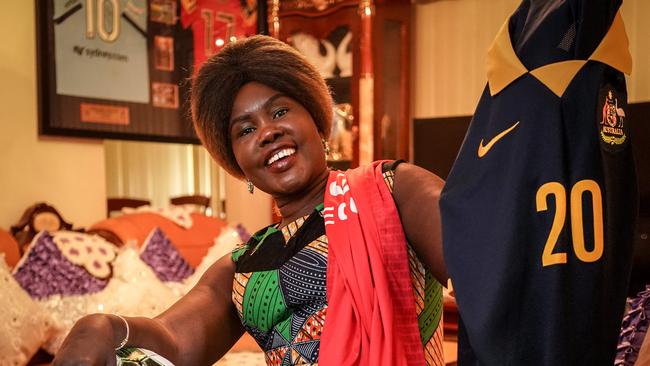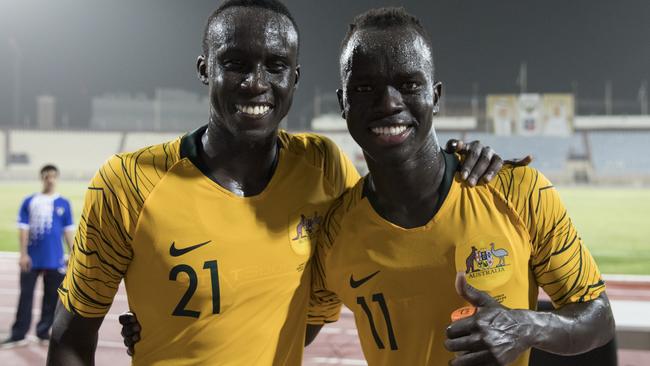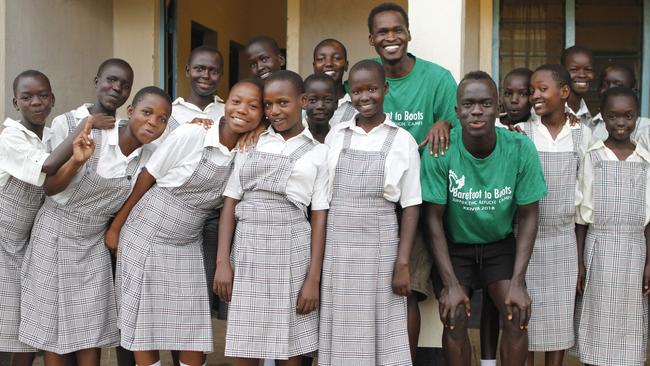Awer Mabil shoots, he scores ... for us and South Sudan
When Awer Mabil scored for the Socceroos, he bookended one of the more remarkable humanitarian stories in Australian sport.

When Awer Mabil guided his first Socceroos goal to the worn-out Kuwaiti keeper’s right yesterday, he bookended one of the more remarkable humanitarian stories in Australian sport.
The 23-year-old Socceroo did what his coach and friends said he would, scoring on debut, securing a 4-0 victory for Australia and showcasing to a nation the latest precocious sporting talent with roots deep in South Sudan’s blood-stained soil.
Flanked by two Kuwaiti opponents, Mabil finished what his friend and fellow African exile Thomas Deng had helped start upfield.
Mabil and Deng, 21, debuted for the Socceroos at Al Kuwait Sports Club in an unlikely set of circumstances yesterday that started for Mabil on the unforgiving, rock-hard pitches of Kakuma refugee camp in northwestern Kenya.
Mabil, who returned to his childhood Kenyan home with The Australian in June, set the 180,000-strong place alight when he scored.

Deng left the heaving Kenyan capital of Nairobi as a young child and somehow, many years ago, the pair found themselves playing soccer together in the backblocks of Adelaide, where they excelled at the world game.
Their mothers, both single, have been credited with not only succeeding in their new country but of sponsoring their children’s rise through world soccer ranks.
Mabil, a winger in the Danish first division side FC Midtjylland, and Deng, a Melbourne Victory defender, have done on the world stage what the South Sudanese footballers Majak Daw and Aliir Aliir have achieved parochially in the AFL.
Mabil and Deng, like their AFL comrades, are pin-up players for their South Sudanese communities, role models for assimilation and are kicking life goals.
“I feel like I am dreaming. The goal is for my mother and my siblings,’’ said Mabil.
“They helped me along in the tough times to get to where I am today. This debut is for them.’’

Mabil’s mother, Agot Dau Atem, watched the match live at her Andrews Farm house in Adelaide, declaring she was “very happy, very happy’’ for her son.
Deng, who spent his teenage years in Melbourne, said the events were hard to process.
“Again, it’s just so crazy growing up together as kids,’’ he said in Kuwait City.
“It’s surreal when you think about it. It’s been a long journey. Not only for Australian kids, also our community. It shows them that nothing is impossible.
“You work hard and the opportunity will be given.’’
Mabil arrived in Adelaide in 2006 with his mother via Australia’s humanitarian program. His older brother, Awer Bul, aged in his mid 30s, came later, having been one of the 40,000 Lost Boys of Sudan who walked for several years across the desert before landing in Kakuma in 1994.
It was through soccer that Awer Mabil met Adelaide businessman Ian Smith and with “the two Awers’’ as co-founders, set up the charity Barefoot to Boots, which is active in Kakuma and other refugee camps. The charity was built on soccer but is expanding. Awer Mabil has devoted much of his non-soccer time to the charity. Mr Smith declared him “a truly remarkable individual’’.




To join the conversation, please log in. Don't have an account? Register
Join the conversation, you are commenting as Logout